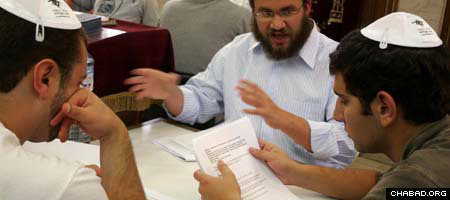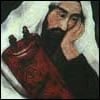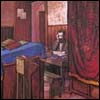While their classmates spent time letting loose at resort locations around the world, four American university students spent their spring break living as yeshiva students at Jerusalem's Mayanot Institute of Jewish Studies.
Brought to Israel by Chabad-Lubavitch Rabbi Eitan Webb, co-director of Chabad on Campus serving Princeton University, the students – Joshua Rodman, Avraham "Theo" Yale, Leon Furchgott and Alex Wugalter – dove right into Mayanot's regular schedule, joining classes commensurate with their ability. They spent their time learning Talmud, Jewish law, Chasidic thought and Hebrew language.
"The experience exposed them to new ways of thinking and new angles," said Webb, who created the trip with a focus on learning as opposed to touring because the four wanted a decidedly untraditional way to spend their vacation.
The week was not without fun, however, as it was capped off by a three-day celebration of Purim that only occurs in Jerusalem on years when Shabbat coincides with the holiday. The students attended a Purim party at Mayanot and visited an army base to boost the morale of Israel's frontline soldiers.
"An exciting part of the trip was the Purim experience in Israel," said Wugalter, a 22-year-old graduate student from Germany who is studying operations research and financial engineering at Princeton. "There was lots of simcha," or "joy" in Hebrew.
Unlike his three trip-mates, Wugalter had not been to Israel previously. Coming from a family unaffiliated with any synagogue, he wanted to learn all he could about Judaism in the short time spent at Mayanot.
"It's an amazing experience to be in such a holy place as Israel," he said. "I'll take back with me what I learn, and take back the excitement of Israel, and the excitement of learning."
History major Rodman, by contrast, went to Mayanot looking for an in-depth learning program previously unavailable to him. A former member of Princeton's football team and the current president of the university's Chabad House, he became more religious at the end of his freshman year. He reasoned that he could grow more in his spiritual life with some yeshiva learning under his belt.
"The learning I'm doing here is something that I hope to employ for my entire life from now on," he said last week. "The learning at college is only for the next paper, and is only relevant for that semester. This learning is for life. There's a completely different objective with Torah learning."
Wugalter observed that the academics at Mayanot were more demanding than in the Ivy League.
"In yeshiva, it's a lot more intense than college, and there's a lot more classes," he said. "It's good to be in yeshiva: During the academic year, there's not as much time to dedicate to learning. It's good to be able to be dedicated to it full time."
The students' encounters, then, aligned with Webb's idea for the week, which was for the students "to experience and study in a completely different atmosphere than they're used to."
"I'm gaining skills and confidence that I'll bring back with me," related Rodman, who now plans on attending a yeshiva like Mayanot after graduation. "On my own, it's much harder to learn these things."
He added that Mayanot's location, smack dab in the center of Israel's capital and Judaism's holiest city, provided an added inspiration.
Said Rodman: "I can't think of a better thing than studying in Jerusalem."








Start a Discussion